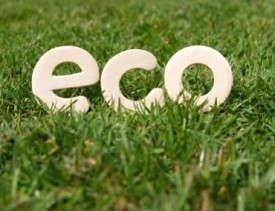Reduce the Carbon Footprint of Your Yard and Garden

Lawns get a bad rap among environmentalists, who are reluctant to use gas-powered mowers and trimmers on water-intensive grass. But if you're not ready to give up the grass, here are some ways to reduce the use of gasoline and other fossil fuels in maintaining your lawn.
Power Down the Mower and Leaf Blower
Gasoline mowers are noisy smog machines. US households use more than 600 million gallons of gas to cut grass, according to Yale research. The Union of Concerned Scientists estimates the average gas mower creates as much pollution as eight cars driving 55 miles per hour. Here are some tips for cutting pollution and saving gas:
- Reduce gasoline usage and pollution by replacing air filters and performing regular maintenance, keeping blades sharp to reduce mowing time, and avoiding spillage while filling the tank.
- Consider replacing a gas mower with an electric model. They use less energy and are non-polluting. The electricity is likely generated in coal-fired power plants, but the carbon usage and pollution is still much lower. They may cost more, but they save much more money in the long run because of lower fuel costs.
- The cleanest option, particularly for small lawns, is a hand-powered reel mower. The only fuel inputs are the food and water you consume, and the simple design is easier to maintain than a gas engine. New reel mowers are lighter and more efficient than clunky old models. They leave clippings on the lawn, which serve as fertilizer and don't take up landfill space. The American Lawn Mower Company sells a variety of push mowers.
NOTE: Push mowers don't work well on tall grass, but once the grass is under control, the vertical scissor-like cutting action leaves lawns healthier. - Gasoline-powered weed trimmers and leaf blowers are even heavier polluters than mowers. Again, greener, quieter electric alternatives are available, as well as old-fashioned brooms and other hand tools.
Other Ways to Cut Carbon
- Zoysia Farm Nurseries and other companies sell slow-growth grasses that naturally need less water and mowing. Zoysia claims its grasses also choke out weeds and resist some insects, reducing the need for the standard petroleum-based chemical pesticides and weed killers. Available as seed, plugs, or sod.
- The top-selling weed killers are Roundup and its generic replicas, which contain fossil fuels. However, there are fossil-fuel-free alternatives. Cockadoodle DOO sells organic weed control made with corn gluten meal. It's designed to preempt weed growth, so must be spread before weeds start to grow in the spring, then at least once again in the late summer or early fall.
- Likewise, most fertilizer is primarily ammonia derived from natural gas. Some organic alternatives with no fossil fuels are specifically designed for lawns. Bradfield Organics' Luscious Lawn and Garden is an alfalfa-based fertilizer. The AgGrand 4-3-3 Liquid Fertilizer contains kelp and fish, and supplies nitrogen, phosphorus, and potassium to the lawn.
When you hire a landscaper, ask what steps he (or she) will take to minimize the carbon footprint of your lawn and garden.
Updated October 18, 2018.
Looking for a Pro? Call us (866) 441-6648

Landscaping Average Costs
Landscapers Experiences

“Stealth” Tree Trimming Was An Incredibly Clean Job

Find A Reliable Full Service Crew For No-Fuss Tree Removal



